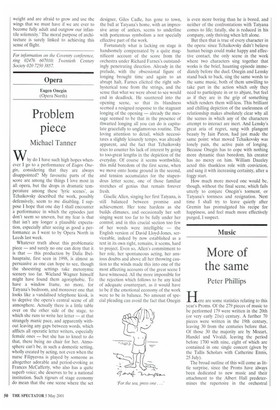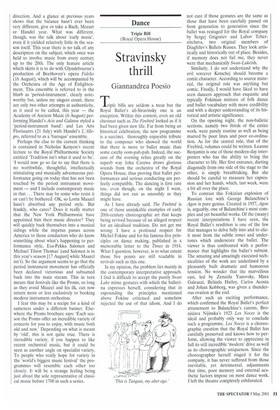Music
More of the same
Peter Phillips
Here are some statistics relating to this year's Proms. Of the 279 pieces of music to be performed 179 were written in the 20th (or very early 21st) century. A further 70 pieces were written in the 19th century, leaving 30 from the centuries before that. Of those 30 the majority are by Mozart, Handel and Vivaldi, leaving the period before 1700 with nine, eight of which are contained in one single concert (given by the Tallis Scholars with Catherine Ennis, 25 July).
The broad outline of this will come as little surprise, since the Proms have always been dedicated to new music and their attachment to the Albert Hall predetermines the repertoire in the orchestral
direction. And a glance at previous years shows that the balance hasn't ever been very different, give or take a Bach, Mozart or Handel year. What was different, though, was the talk about 'early music', even if it yielded relatively little in the season itself. This year there is no talk of any description on the subject, which once was held to involve music from every century up to the 20th. The only feature article which skirts it is to do with Glyndebourne's production of Beethoven's opera Fideho (16 August), which will be accompanied by the Orchestra of the Age of Enlightenment. This ensemble is referred to in the blurb as 'period-instrument', clearly noteworthy but, unless my singers count, there are only two other attempts at authenticity, as it used to be called, this year — the Academy of Ancient Music (6 August) performing Handel's Ads and Galatea styled a 'period-instrument band'; and Les Arts Florissants (21 July) with Handel's L'Allegro, referred to as a 'baroque' ensemble.
Perhaps the clue to the current thinking is contained in Nicholas Kenyon's recent lecture to the Royal Philharmonic Society entitled 'Tradition isn't what it used to be'. 'I would now go so far to say that there is no worthwhile, thoughtful, intellectually stimulating and musically adventurous performance going on today that has not been touched by the period instrument movement — and I include contemporary music in that .. . There may be some who resist it or can't be bothered: OK, so Lorin Maazel hasn't absorbed any period style. But frankly, who cares? Does it really matter that the New York Philharmonic have appointed him their music director? They will quickly back themselves into a musical sidings while the impetus passes across America to those conductors who do know something about what's happening to performance style, Esa-Pekka Salonen and Michael Tilson Thomas' (and Salonen is in this year's season [17 August] while Maazel isn't). So the argument seems to go that the period instrument movement has officially been declared victorious and subsumed back into the main stream. This in turn means that festivals like the Proms, so long as they avoid Maazel and his ilk, can now return more or less exclusively to booking modern instrument orchestras.
I fear this may be a recipe for a kind of sameness under a different banner. Elsewhere the Proms brochure says: 'Each season the Proms offer an incredible variety of concerts for you to enjoy, with music both old and new.' Depending on what is meant by 'old', this is not quite true. There is incredible variety, if you happen to like recent orchestral music, but it could be seen as another angle on specialist variety. To people who really hope for variety in the 'world's biggest music festival' the programmes will resemble each other too closely. It will be a strange feeling being just about the sole representative of classical music before 1700 in such a series.











































































 Previous page
Previous page